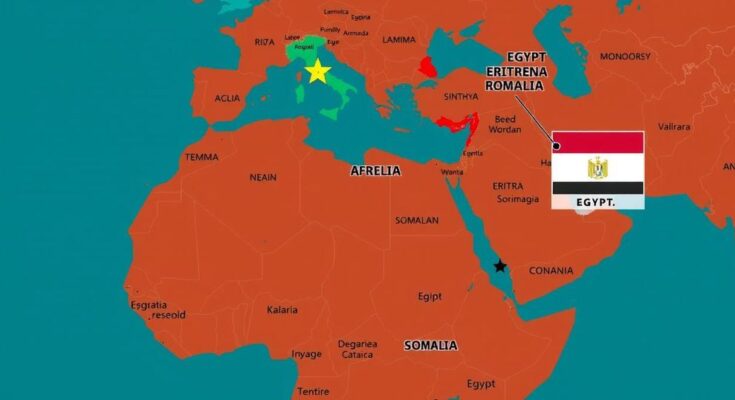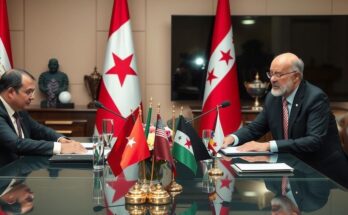A recent summit between Egypt, Eritrea, and Somalia in Asmara highlights a strategic alignment against Ethiopia amid ongoing regional tensions. While presented as an effort to bolster regional security, the meeting underscores a collective apprehension regarding Ethiopia’s influence, particularly relating to the Grand Ethiopian Renaissance Dam. This evolving alliance could signify a shift in regional power dynamics, introducing both opportunities for cooperation and risks of exacerbated conflict as Ethiopia navigates its relationships with its neighbors.
The recent trilateral summit involving Egypt, Eritrea, and Somalia, convened in Asmara, Eritrea, marks a significant shift in the geopolitical landscape of the Horn of Africa—an area historically marred by instability, rivalries, and competing ambitions. This assembly, ostensibly aimed at presenting a unified front in the face of regional security challenges, reflects deeper underlying tensions, particularly concerning Ethiopia, Africa’s second-largest nation, which remains a pivotal figure in regional dynamics. During the summit, leaders Isaias Afwerki of Eritrea, Abdel Fattah al-Sisi of Egypt, and Hassan Sheikh Mohamud of Somalia proclaimed their commitment to cooperation and maintaining territorial integrity, publicly rejecting external interference. However, the summit’s subtext suggested an encirclement strategy aimed at Ethiopia, particularly amidst ongoing disputes regarding Ethiopia’s engagement with Somaliland and the contentious Grand Ethiopian Renaissance Dam (GERD). The nuanced alliances within the Horn of Africa are characterized by intricate historical grievances and power struggles. Ethiopia’s controversial agreement with Somaliland has intensified its already fraught relations with Somalia, which has yet to recognize Somaliland’s independence following its 1991 secession. Additionally, Somalia’s military pact with Egypt, established in August and complemented by arms supplies to combat the al-Shabaab insurgency, further fortifies the Cairo-Mogadishu alliance against Ethiopia. At the heart of the discussions was not just a desire to enhance regional security but an implicit recognition of the security concerns arising from Ethiopia’s maneuvers in the region. Ethiopia’s escalating tensions with Egypt over the GERD, which Cairo perceives as an existential threat to its water resources, complements these dynamics. The impasse in negotiations has only inflamed hostilities and the perceived need for strategic alliances. Eritrea, often regarded as the “North Korea of Africa” due to its isolationist policies, sees its involvement in this alliance as a means to augment its influence while counteracting Ethiopia’s ascendancy. With its geographic proximity to the critical Bab el-Mandeb Strait, Eritrea’s collaboration with Egypt becomes part of a broader strategy aimed at curbing Ethiopia’s power. The Asmara gathering exemplifies a reconfiguration of power in the Horn of Africa, diverging from traditional alliances. Egypt, Eritrea, and Somalia are emerging as a united front, with military might playing a critical role in this alliance. It remains uncertain whether this collaboration will lead to enhanced regional stability or further exacerbate existing tensions.
The Horn of Africa is a region characterized by complex geopolitical dynamics, influenced by historical conflicts, security issues, and resource management. Ethiopia’s political actions, particularly concerning the Grand Ethiopian Renaissance Dam, have engendered significant rivalry with Egypt, which relies heavily on the Nile for its water supply. The recent establishment of a military agreement between Somalia and Egypt further complicates the situation, as both countries seek to counterbalance Ethiopia’s influence in the region. The alliances are shifting, presenting new alliances that reflect the evolving power structure in the Horn of Africa and necessitate a careful diplomatic response from Ethiopia to maintain its security and stability.
The summit involving Egypt, Eritrea, and Somalia represents a critical moment in the shifting alliances of the Horn of Africa. With Ethiopia at the center of concern, these developments signal a potential redistribution of power that could either lead to increased stability or heightened tensions in the region. Ethiopia’s diplomatic engagement, both regionally and internationally, will be essential in navigating these changes and securing its interests. As these alliances evolve, the geopolitical landscape of the Horn of Africa will undoubtedly continue to transform, further complicating security dynamics in the area.
Original Source: thehill.com




